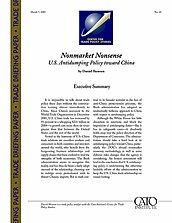Vested in the harmony of U.S.-China trade relations are countless workers and consumers in both countries and investors around the world, who benefit from the burgeoning business relationships and supply chains that have evolved to wed the strengths of both economies. The Bush administration seems to recognize this reality, and has thus far been a fairly adept steward of the relationship, choosing not to indulge every protectionist wish to thwart Chinese imports. But in stark contrast to its broader restraint in the face of anti-China protectionist pressure, the Bush administration has adopted an unabashedly bellicose approach to China with respect to antidumping policy.
Although the White House has little discretion to intervene and block the imposition of antidumping duties–like it has in safeguards cases–it absolutely holds sway over the policy direction of the Department of Commerce. The administration should take a hard look at its antidumping policy toward China, particularly the DOC’s absurd nonmarket economy methodology, as well as some dubious rules changes that the agency is considering. An honest assessment will lead to the conclusion that U.S. antidumping policy is undermining the otherwise laudable efforts of the administration to keep the U.S.-China trade relationship on sound footing.


